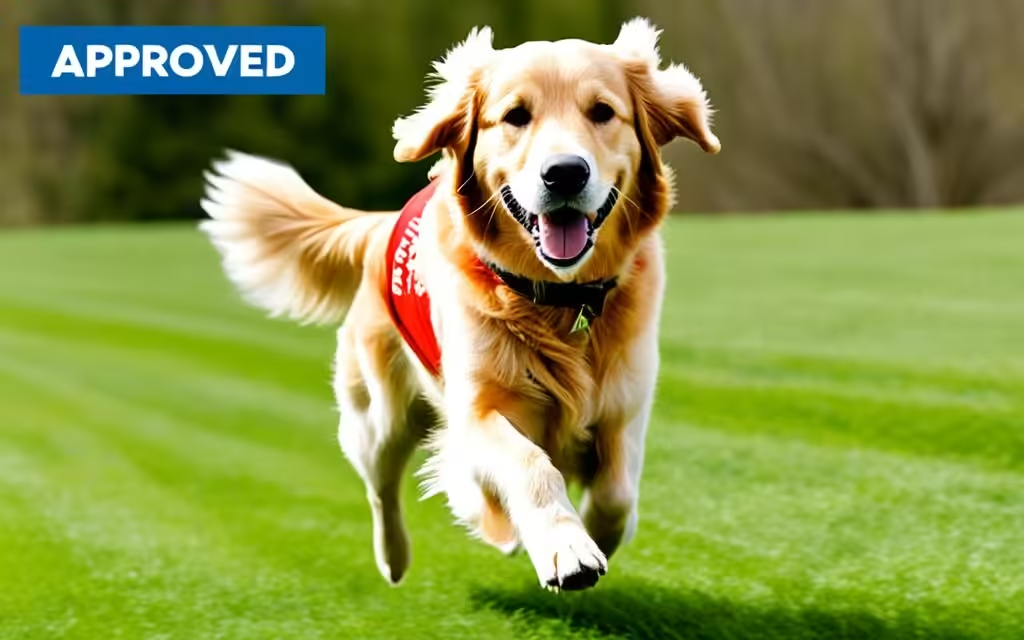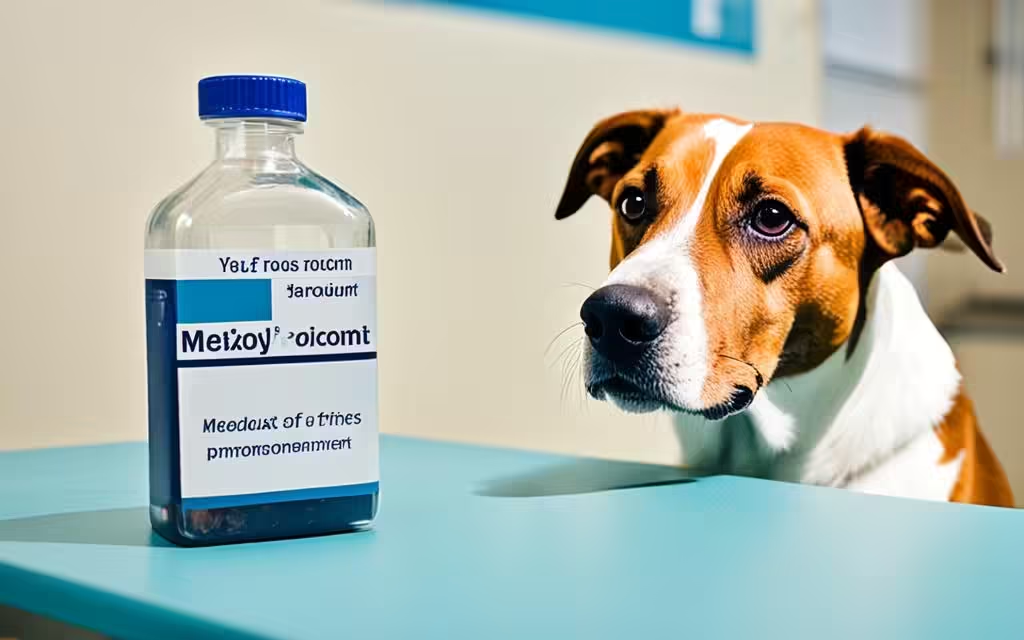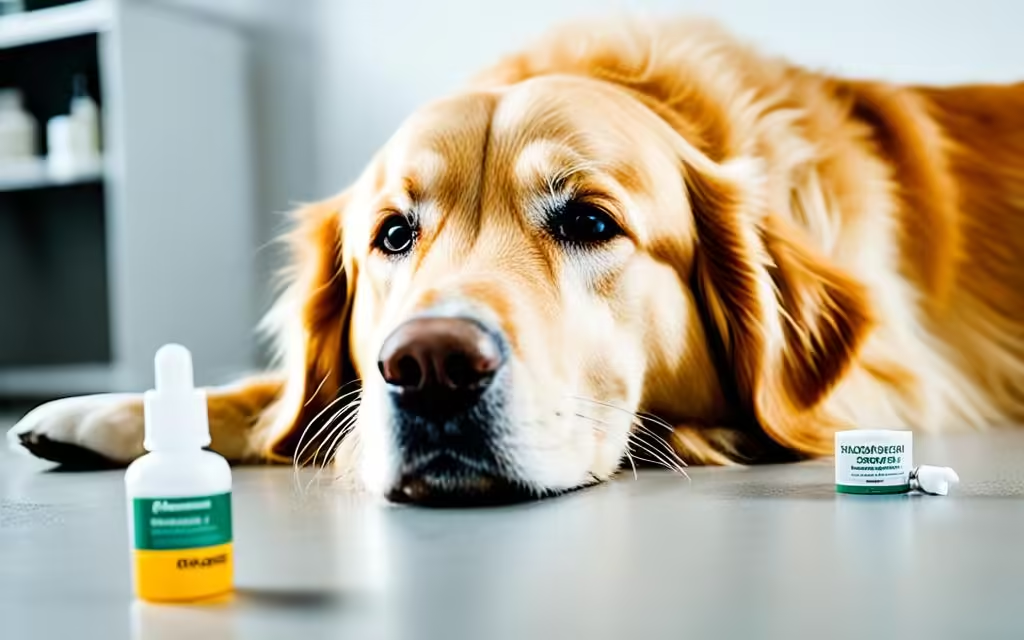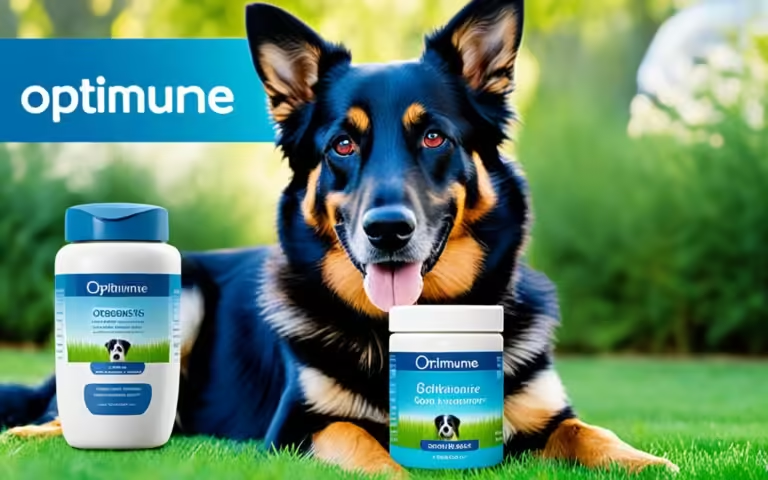Meloxidyl for Dogs: Pain Relief Medication
Did you know Meloxidyl is a big deal for dogs with pain? It’s a non-steroidal anti-inflammatory drug (NSAID) that helps dogs feel better. For just $16.01 per bottle, it eases the pain and swelling from osteoarthritis in dogs.
Pet owners trust Meloxidyl to make their dogs happier. It comes with two syringes for easy dosing based on the dog’s size1. Dogs start with a special dose on the first day, then get a smaller dose every day after.
Meloxidyl works for dogs of all sizes, with a small syringe for little dogs and a big one for bigger dogs1. You can choose from 10, 32, or 100 mL bottles, so you can find the right size for your dog1.
But remember, Meloxidyl is not safe for cats. It can cause serious kidney problems and even death in cats1. Also, dogs that are allergic to meloxicam should not take this medicine1.
Key Takeaways
- Meloxidyl is a prescription NSAID medication used to control pain and inflammation associated with osteoarthritis in dogs.
- It is a cost-effective solution, priced at $16.01 per bottle, and comes with precise dosing syringes.
- Meloxidyl is not recommended for use in cats due to the risk of serious side effects like acute renal failure and death.
- Proper dosage and administration are crucial, with specific guidelines based on the dog’s weight.
- Potential adverse reactions in dogs may include vomiting, diarrhea, lethargy, decreased appetite, and behavioral changes.
Understanding Meloxidyl: A Non-Steroidal Anti-Inflammatory Drug
Meloxidyl is a type of non-steroidal anti-inflammatory drug (NSAID) in the oxicam class2. It has meloxicam as its main ingredient and sodium benzoate as a preservative. This drug works by stopping the production of prostaglandins. These substances cause inflammation, pain, and swelling in the body2.
By blocking cyclooxygenase (COX) enzymes, Meloxidyl lessens inflammation and helps with pain in dogs with osteoarthritis2.
What is Meloxidyl?
Meloxidyl is a vet-prescribed medicine for dogs2. It aims to manage pain and inflammation, helping dogs move better2. Dogs may start to feel better within a few days of taking it2.
How Does Meloxidyl Work for Pain Relief?
Meloxidyl stops the production of prostaglandins, which cause inflammation, pain, and swelling2. This action helps reduce inflammation and ease pain in dogs with conditions like osteoarthritis2.
It’s given to dogs with osteoarthritis, a condition that makes joints hurt due to wear and tear2. Meloxidyl targets the inflammation and pain at its source. This can make dogs with this condition feel better and live a fuller life2.
“Meloxidyl is designed to control pain and inflammation in dogs and improve their mobility.”2
Meloxidyl for Dogs: Approved Uses and Benefits
Meloxidyl is a non-steroidal anti-inflammatory drug (NSAID) approved for dogs with osteoarthritis3. It helps reduce pain and inflammation. This makes dogs more mobile and active4. Dogs with osteoarthritis can live better lives thanks to Meloxidyl.
FDA-Approved for Osteoarthritis Pain in Dogs
The FDA has approved Meloxidyl for osteoarthritis pain in dogs3. Studies show it works as well as Metacam, a similar drug4. It comes in tablets, liquids, and injectables, making it easy for vets and owners to use3.
Improving Mobility and Quality of Life
Meloxidyl reduces inflammation and pain, helping dogs move better4. This means dogs with osteoarthritis can play and run more4. It’s a great treatment for dogs with this condition, making them more comfortable and happy.

“Meloxidyl has been a game-changer for our dog, Buddy. Since starting the medication, he’s been able to play and run around like he did when he was younger. We’re so grateful for the improved quality of life it has provided him.”
– Jane Doe, Dog Owner
| Meloxidyl Approved Uses | Benefits for Dogs |
|---|---|
| Pain and inflammation associated with osteoarthritis | Improved mobility and physical activity |
| Acute and chronic musculoskeletal disorders | Enhanced quality of life |
| Post-operative mild to moderate pain management | Reduced inflammation and pain |
In summary, Meloxidyl is a medication approved by the FDA for dogs with osteoarthritis3. It helps dogs move better and live happier lives453.
Meloxidyl for Dogs: Dosage and Administration
Meloxidyl is a trusted drug for dogs to manage pain and inflammation. Vets often recommend it. It’s important to know how to give it safely and correctly6.
Accurate Dosing with Calibrated Syringes
Meloxidyl Oral Suspension comes with two syringe sizes for different dog weights. The small syringe is for dogs under 15 lbs, and the large one is for dogs 15 lbs and heavier7.
Dosage Guidelines Based on Dog’s Weight
The first dose of Meloxidyl is 0.09 mg/lb (0.2 mg/kg) on the first day6. Then, the dose is cut in half for all future treatments6. The syringes are made to help give the right dose based on the dog’s weight7.
Improvement from Meloxidyl is usually seen in 3-4 days. If there’s no change after 10 days, stop the treatment6. Watch for signs of bad reactions like not eating, vomiting, diarrhea, blood in stool, or acting tired, in the first week68.
By using the right dosage and syringes, pet owners can give Meloxidyl safely and effectively. This helps keep their dogs happy and free from pain678.
Meloxidyl for Dogs: Potential Side Effects and Precautions
Meloxidyl is a common medication for dogs, but it can have side effects9. Dogs may experience stomach issues like vomiting, diarrhea, and a decrease in appetite. They might also seem tired or act differently9. If your dog shows any bad reactions, stop the treatment and call your vet right away9.
More serious issues can happen, like stomach ulcers, kidney damage, and liver problems from xylitol poisoning9. These problems might need medical help. Also, Meloxidyl can interact badly with other medicines9.
Don’t give Meloxidyl to dogs with bleeding issues, or to pregnant, nursing, or very young dogs. It’s not safe for them. Signs of too much Meloxidyl include vomiting, belly pain, black poop, diarrhea, weakness, muscle moves, and seizures9.
Keep an eye on your dog if they’re on Meloxidyl for a long time. Check their liver and kidney health. Vets should teach clients how to safely use pain meds in dogs and cats9.
Meloxidyl comes in tablets, spray, and liquid. Start with a small dose, then lower it later10. Give it with food, especially for small dogs, to avoid mouth problems11.
Some dogs can’t take Meloxidyl because of health issues or dehydration11. Don’t use it during pregnancy or while nursing. Stop prednisone before starting Meloxidyl to avoid bad reactions11.
In summary, Meloxidyl can help with pain in dogs, but be aware of the risks and talk to your vet91110.

| Potential Side Effects of Meloxidyl in Dogs | Severity | Occurrence Rate |
|---|---|---|
| Gastrointestinal upset (vomiting, diarrhea, appetite loss) | Mild to moderate | Common |
| Kidney dysfunction | Moderate to severe | Uncommon |
| Liver damage | Moderate to severe | Rare |
| Gastrointestinal ulcers | Moderate to severe | Rare |
| Anaphylactic shock (allergic reaction) | Severe | Rare |
“Meloxidyl should be used with caution in dogs and closely monitored by veterinarians to ensure the safety and well-being of the patient.”
meloxidyl for dogs: Contraindications and Drug Interactions
When giving Meloxidyl, a non-steroidal anti-inflammatory drug (NSAID), to dogs, be aware of possible contraindications and drug interactions. Dogs allergic to meloxicam or other NSAIDs should not take Meloxidyl. This can cause serious side effects12.
Dogs with Known Hypersensitivity to Meloxicam
Meloxicam, found in Meloxidyl, is an FDA-approved NSAID for dogs. It helps with pain, reduces inflammation, and lowers feve2. But, dogs allergic to meloxicam or other NSAIDs should not get Meloxidyl. This could lead to severe health issues12.
Concomitant Use with Other NSAIDs and Steroids
Don’t mix Meloxidyl with other NSAIDs or steroids. This increases the risk of side effects. Using Meloxidyl with drugs like carprofen (Rimadyl), ACE inhibitors, diuretics, prednisone, warfarin, and certain supplements is dangerous13.
Tell your vet about all meds your dog is on to prevent harmful interactions. It’s important to check liver and kidney function in dogs on Meloxidyl. Long-term use can affect these organs13.
In summary, dogs allergic to meloxicam or NSAIDs should not take Meloxidyl. Also, don’t mix it with other NSAIDs or steroids. Always tell your vet about your dog’s medications to avoid bad interactions. Regular vet visits and monitoring are key when using Meloxidyl to keep your dog safe141213.
“Meloxidyl should be used with caution in dogs, and pet owners must work closely with their veterinarian to ensure the safe and effective use of this medication.”
Comparing Meloxidyl to Other NSAIDs for Dogs
Vets often use non-steroidal anti-inflammatory drugs (NSAIDs) like meloxidyl vs other nsaids for dogs to help dogs with pain and swelling. Meloxidyl is as good as other NSAIDs, like carprofen (Rimadyl), in easing pain from conditions like osteoarthritis15.
Meloxidyl might be a better choice for some owners because it’s cheaper and safer. Vets can help pick the right NSAID based on the dog’s health, past medical issues, and what the owner prefers15.
Efficacy, Cost, and Safety Considerations
Research shows meloxidyl works as well as other NSAIDs in dogs. In one study, it beat carprofen and meloxicam in reducing pain in dogs with uveitis16.
Though the evidence on meloxidyl vs carprofen for dog osteoarthritis is weak, both are seen as good treatments17.
Meloxidyl might be cheaper for some owners than other NSAIDs. The price depends on the dose and how long it’s used, but it’s often seen as a good deal compared to pricier options.
All NSAIDs can have side effects, like vomiting or stomach problems15. It’s important to use them carefully and watch the dog closely to avoid issues15.
Choosing between meloxidyl and other NSAIDs should be done with a vet’s advice. Consider the dog’s needs, how bad their condition is, and what the owner can afford. This way, owners can make the best choice for their dogs151617.
Monitoring and Adjusting Meloxidyl Therapy for Dogs
Pet owners must work closely with vets when giving Meloxidyl to their dogs. It’s a non-steroidal anti-inflammatory drug (NSAID). Regular vet check-ups are key to watch how the dog reacts to the medicine. They help spot side effects and adjust the dosage or treatment as needed.
Importance of Regular Veterinary Check-ups
Meloxidyl helps dogs feel less pain, but it needs careful handling. Vets will keep an eye on the dog’s progress. They look at lameness, weight-bearing, pain, and overall improvement18. By being watchful and making changes on time, pet owners can keep their dogs moving well and happy.
At these check-ups, vets check the dog’s health closely. They watch for side effects of Meloxidyl18. These can include stomach problems like vomiting, diarrhea, or not wanting to eat. In serious cases, dogs might have kidney issues, feel tired, or show other signs of trouble18.
By working with their vet, dog owners can quickly adjust the Meloxidyl if needed19. This careful watching helps balance pain relief with avoiding bad side effects. It keeps the dog feeling good overall.
Remember, Meloxidyl should be used with care and under a vet’s guidance20. Getting the dosage and timing right is key for safe and effective use in dogs20.
“Regular veterinary check-ups are essential when a dog is receiving Meloxidyl therapy. The veterinarian will monitor the dog’s response to the medication, evaluate any potential side effects, and make any necessary adjustments to the dosage or treatment plan.”
Keeping in touch with the vet and watching how the dog reacts to Meloxidyl is important. It helps make sure this pain relief medicine is safe and works well for a long time181920.
Essential Drug Information for Meloxidyl
Meloxidyl is a prescription NSAID medication in the form of an oral suspension21. It comes in 10 mL, 32 mL, and 100 mL bottles, with two dosing syringes21. This medication is a generic version of metacam and can only be obtained through licensed vets and pharmacies21. It’s only for vet prescriptions.
Meloxidyl is an NSAID approved for pain, inflammation, and arthritis in dogs12. It’s a tasty liquid given once a day12. Your vet will decide the right dose based on your dog’s weight and the type of inflammation12.
It’s also used for pain and inflammation in other animals like horses, cows, and birds12. But, its safety and effectiveness aren’t proven for all these animals22.
| Animal | Meloxidyl Formulation | Approved Uses |
|---|---|---|
| Dogs | Oral suspension (1.5 mg/ml) | Musculoskeletal disorders (acute and chronic) |
| Cats | Oral suspension (0.5 mg/ml), Injection (5 mg/ml) | Chronic musculoskeletal disorders, Post-operative pain |
| Cattle | Injection (20 mg/ml) | Acute respiratory infection, Diarrhea, Mastitis (with antibiotics) |
| Pigs | Injection (20 mg/ml) | Non-infectious locomotor disorders, Puerperal septicaemia |
| Horses | Injection (20 mg/ml) | Musculoskeletal disorders (acute and chronic), Colic pain relief |
Meloxidyl was approved in the European Union in 2007 for its benefits and risks21. It has an EMA product number of EMEA/V/C/000115 and the latest update was on January 31, 201921.
Most pets find Meloxidyl tolerable, but some may experience side effects like loss of appetite or vomiting21. Serious issues like ulcers or liver problems can also happen12. Be careful if you’re giving it with other anti-inflammatory drugs or steroids22.
Keep Meloxidyl at room temperatures between 68-77°F12. Don’t slaughter cattle, pigs, or horses for 5 to 15 days after giving them this medication21.
In summary, Meloxidyl is a vet-only NSAID for pain, inflammation, and arthritis in dogs and some other animals. Vets should watch the dosage and side effects closely to help your pet stay healthy.
Conclusion
Meloxidyl is a key medication for dogs with osteoarthritis pain and inflammation. A study showed it greatly reduced pain and inflammation in dogs after four weeks of use. It’s a COX-2 selective NSAID that helps control inflammation without harming other body functions.
Under a vet’s care, Meloxidyl can make dogs more mobile and happier by easing osteoarthritis symptoms. After two weeks, dogs showed big improvements in walking, standing, and feeling less pain. It’s easy to use and stays in the system for about a day, making it a good choice for dogs.
Though it might cause some side effects like stomach issues or high liver enzymes, research says it’s safe and works well for dogs with osteoarthritis pain. It offers all-day pain relief and lowers inflammation, helping dogs live better with this condition.
FAQ
What is Meloxidyl?
How does Meloxidyl work for pain relief in dogs?
What are the approved uses and benefits of Meloxidyl for dogs?
How should Meloxidyl be dosed and administered for dogs?
What are the potential side effects and precautions of Meloxidyl for dogs?
What are the contraindications and drug interactions for Meloxidyl in dogs?
How does Meloxidyl compare to other NSAID options for dogs?
What is the importance of regular veterinary check-ups when a dog is on Meloxidyl therapy?
What is the essential drug information for Meloxidyl?
Source Links
- Meloxidyl Osteoarthritis Pain Med for Dogs & Cats 1.5 mg/ml, 10 ml
- Meloxidyl for Dogs | Great Pet Care
- Meloxidyl; INN: meloxicam
- Meloxidyl® from Ceva Animal Health
- Meloxidyl Osteoarthritis Pain Med for Dogs & Cats 1.5 mg/ml, 100 ml
- Meloxidyl; INN: meloxicam
- Side effects of meloxicam in dogs
- Side Effects of Meloxicam for Dogs | Canna-Pet®
- Mar Vista Animal Medical Center
- Meloxicam (Metacam®, OroCAM®, Loxicom®, Meloxidyl®, Meloxicam Injection, Meloxicam Solution for Injection)
- Meloxicam (Metacam)
- Meloxicam for Dogs | Wag!
- Get the Facts about Pain Relievers for Pets
- No title found
- In dogs diagnosed with osteoarthritis, is meloxicam superior to carprofen for reducing patient discomfort?
- Package Insert for Dogs
- VetOne Meloxidyl (Meloxicam) 1.5 mg/ml Oral Suspension for Dogs
- Meloxicam Injection for Dogs – Drugs.com
- Meloxidyl | European Medicines Agency
- DailyMed – MELOXIDYL- meloxicam injection, solution
- Package Insert for Dogs







